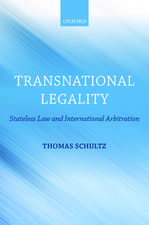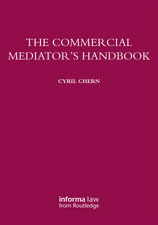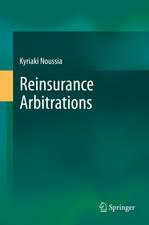International Jurisdiction and Commercial Litigation: Uniform Rules for Contract Disputes
Autor Hélène van Lithen Limba Engleză Hardback – 10 iun 2009
It further explores whether any common grounds in international jurisdiction rules exist and assesses the feasibility of a uniform global system for international contractual disputes also in relation to the previous work of The Hague Conference of Private International Law on a worldwide jurisdiction convention.
A valuable text for academics and practitioners dealing with private international law and international commercial litigation worldwide.
Winner of the AiSDC Prize 2010.
Preț: 967.88 lei
Preț vechi: 1180.34 lei
-18% Nou
Puncte Express: 1452
Preț estimativ în valută:
185.20€ • 193.37$ • 153.28£
185.20€ • 193.37$ • 153.28£
Carte tipărită la comandă
Livrare economică 04-18 aprilie
Preluare comenzi: 021 569.72.76
Specificații
ISBN-13: 9789067043038
ISBN-10: 9067043036
Pagini: 585
Ilustrații: 606 p.
Greutate: 1.09 kg
Ediția:2009
Editura: T.M.C. Asser Press
Colecția T.M.C. Asser Press
Locul publicării:The Hague, Germany
ISBN-10: 9067043036
Pagini: 585
Ilustrații: 606 p.
Greutate: 1.09 kg
Ediția:2009
Editura: T.M.C. Asser Press
Colecția T.M.C. Asser Press
Locul publicării:The Hague, Germany
Public țintă
ResearchDescriere
avoiding gaps and provide a claimant with limited forum shopping possibilities. In that same vein, the paradigm proposed by Ms. Van Lith ought to shift to special grounds of jurisdiction based on sufficient connection between the defendant and the forum state. In that respect, she proposes jurisdiction at the place where the defendant has a fixed place of business from which he carries out business activities directly related to the claimant’s contractual claim. Absent such a place of business, jurisdiction is to be vested in the courts of the country where the defendant is engaged in substantial business activities in relation to the contract with a limited forum shopping for a claimant in favour of the court of the defendant’s home country. Other general or special grounds for jurisdiction (such as claimant-related connections or property-based connections) are rejected because they do not meet the proposed paradigm of sufficient connection. As to exceptions to international jurisdiction rules as proposed, Ms. Van Lith comes to the conclusion that a general escape provision is to be avoided except for the ‘tra- acting business’ rule where – in accordance with the paradigm proposed – international jurisdiction can be avoided in favour of the defendant’s home court when the dispute is insufficiently connected with the forum making it unfair under the circumstances to expect the defendant to be subjected to the jurisdiction of that court. In this respect, a balanced approach to predictability and flexibility is being proposed.
Cuprins
Uniform Jurisdiction Rules in Europe: The Brussels Regulation.- National Jurisdiction Rules in Continental Europe.- English Common Law on International Jurisdiction.- The Jurisdictional Scheme of the United States.- Contrasting Approaches to International Jurisdiction.- Assessing Bases For International Jurisdiction In Contract Disputes.- Correction Mechanisms: Requirements and Exceptions.- Conclusions and Propositions.
Notă biografică
Hélène van Lith is Senior Lecturer and Assistant Professor of Private International and Comparative Law at Erasmus School of Law, Erasmus University Rotterdam.



















